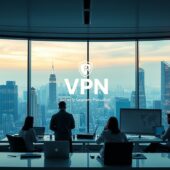Top 5 Best VPN
Today’s interconnected world demands online privacy and security more than ever. From a person’s confidential information to social information, everything is being stolen by different organizations. The play of boundaries is still going strong. The more days are passing the more dangerous it is getting for people to use the internet or even play games without trading personal information without consent. This is where best VPN comes in to rescue.
VPNs can block third parties from stealing personal information and use it for purposes. In this article we will know more about VPN and see what it has to offer you along with 5 suggestions of best VPNs.
What Is VPN?
Before digging in, the first thing we need to know about is what a VPN is. VPN stands for Virtual Private Network. VPN provides a safe and private connection over a public network, especially the internet. VPN lets the users browse the internet privately and securely in different locations by routing users’ internet traffic through a safe tunnel. VPNs mask your real IP address and allow you to roam around without tension. It conceals your information and makes it challenging for hackers, governments, internet service providers and other organizations to monitor your online activities.
VPNs have a number of advantages, such as increased online privacy, defense against cyberthreats, access to geo-restricted content, and the capacity to get around internet censorship in some areas. Best VPN is majorly used by people, companies, and organizations to protect sensitive information, preserve anonymity, and provide secure communication over the internet. Depending on the needs, you can choose the type of best VPN you need.
Types Of VPNs
There are multiple types of best VPNs available for you to choose according to your needs. Let’s discuss more about the following matter.
Remote Access VPN: This VPN is for individual users to link remotely to a private network via the internet. It is also used by employees who require secure access to corporate information, files and apps to use away from the office.
Site-to-Site VPN: This VPN is also known as Router-To-Router VPN. This kind of VPN links several networks at one time over the internet. Such as, branch offices or data centers. It offers safe data transport and communication among various organizational locations.
SSL/TLS VPN: This is a web-based VPN that provides a secure connection between a user’s web browser and a distant server. Secure Socket Layer or SSL and Transport Layer Security or TLS VPNs are known as SSL/TLS VPNs. They are frequently used to offer access to online programs and services.
MPLS VPN: MPLS VPN stands for Multi-Protocol Label Switching. Large businesses and service providers frequently use VPNs. They build a private network using MPLS technology that can transmit data directly and securely between various sites.
Mobile VPN: Mobile VPN is made for portable electronic devices such as smartphones and tablets. Users can use it to get access to company resources and the internet safely on the go.
PPTP VPN: Poin to Point Tunneling Protocol is a less secure VPN protocol. Although it is simple to set up, due to its vulnerabilities, it is not advised to use sensitive and important data.
Every VPN type has advantages and is appropriate for certain situations. Choosing the right VPN highly depends on the unique needs and specifications of the user or company.
How Does VPN Work?
VPN functions by building a tunnel between the server or network and the user’s device. Users can securely access services and resources through the connection that is made over the internet.
A simplified explanation of how VPN works is given below.
Data Encryption: Any sent or received data traffic between the user’s devices and VPN is encrypted directly by the VPN. This encryption ensures the data security and confidentiality. It safeguards the data from unauthorized individuals that might try to prey.
VPN Server: The data is then transmitted over the internet to a VPN server that is situated in a separate city or nation. The VPN server serves as a conduit between the user’s device and the internet.
IP Address Masking: The user’s real IP address is substituted with the IP address of the VPN server when data travels through the VPN server. By using a technique called IP address masking, the user’s true identity and location can be concealed.
Access To Restricted Content: Users can circumvent geographic limitations and access contents that are blocked or restricted in their region by connecting to a VPN server in a different country. For instance, a user in a one nation can access US based streaming services by connecting to a VPN server there.
Secure Connection: The VPN server decrypts the encrypted data before forwarding it to its internet destination. The same encryption and IP address making procedures are used to ensure a safe and private connection throughout the whole data transmission when the response is sent back to the user.
End-to-End Encryption: If someone were to interpret the data during transmission, they would only be able to decrypt gibberish without the decryption key as the data is encrypted until it reaches the user’s device.
In conclusion, a best VPN establishes a secret and secure tunnel between a user’s device and a remote server. The tunnel enables the users to safely access the internet while safeguarding their data from third parties and get around geographical restrictions. When using public Wi-Fi networks or gaining access to sensitive information online, it is an important tool to preserve online privacy and security.
Top 5 Best VPN
Here are the top 5 best VPNs for you to try these and choose the best one accordingly.
- CovermeVPN
- VyprVPN
- Windscribe
- ProtonVPN
- IvacyVPN
In conclusion, best VPN have completely changed how we access and distribute information online. VPNs are becoming a necessary tool for people and businesses looking to navigate the online world safely and more effectively. Whether it is for personal data protection, accessing geo-restricted content, or facilitating secure corporate interactions. VPNs are expected to be at the forefront of preserving online privacy and advancing a more accessible and secure interest as technology develops.







VPN Black Friday Deals 2023: Trends and Tips - Cover Me VPN
[…] appears that the first use of the time period “VPN Black Friday Deals” turned into given, not to consult Christmas shopping, but on the subject of an American […]
Top 5 Best VPN deals on Black friday - Microdeft
[…] This VPN is continually on the pinnacle of the fastest VPN listing. You’ll get a continuing browsing enjoy, no lags or buffering with the proprietary NordLynx […]